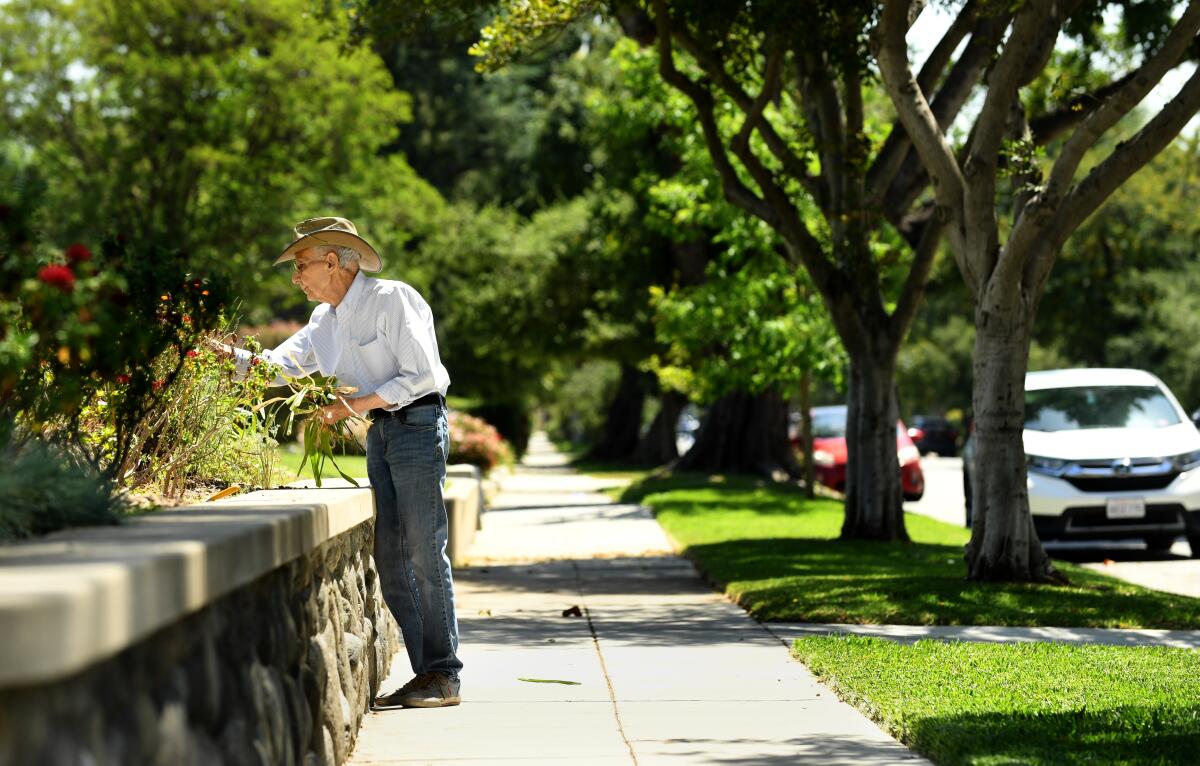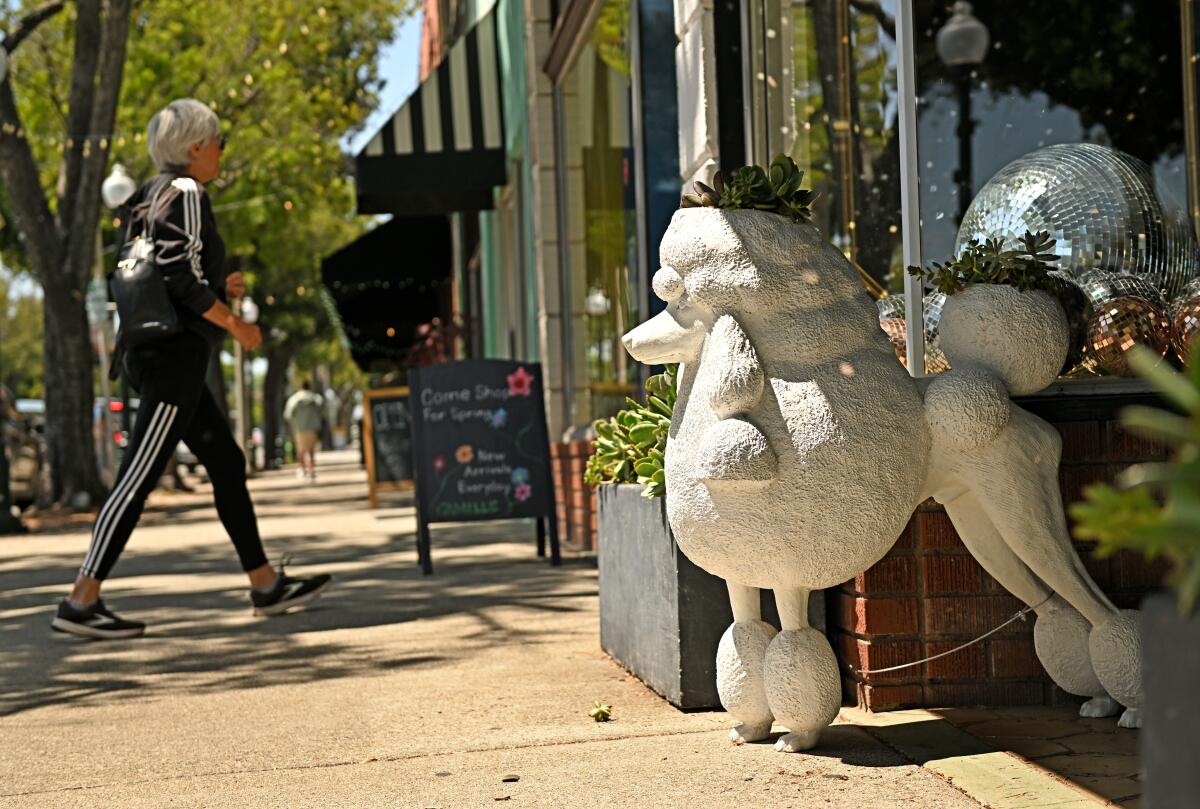The house was listed at $1.2 million. The sale price? Even crazier than you might think

- Share via
The three-bedroom, one-bath house was listed at $1.2 million.
It sold in a week, at more than double that price.
For $2.5 million.
In the insane Southern California housing market — in which legions of people are priced out of home ownership while people with boatloads of hard cash are battling it out in epic bidding wars — we’re all familiar with houses selling above the listing price. (Check out The Times’ Great SoCal House Hunt.)
But I think we’ve now, officially, reached a level of absurdity. I have nothing against either the buyer or the seller here. More power to them. But this is a case of capitalism run amok, and it speaks to a culture that keeps putting more distance between the haves and have-nots.
When I first saw the ad in the Pasadena Outlook, touting the $2.5-million transaction in South Pasadena, I thought it was a misprint.
“$1.3 MILLION OVER ASKING PRICE,” said the ad.
I called the selling agent, Ruth T. Mayeda, who works out of Coldwell Banker’s San Marino office and has been in the business for more than 20 years. She said homes in the area have sold for a few hundred thousand dollars above asking, and sometimes even more.
“But I think this could be a record,” Mayeda said.
Ed Afsharian, her office manager, told me he wasn’t surprised.
“It’s not a negotiation anymore,” Afsharian said. “It’s a competition.”

Not for every listing. Some houses sit on the market for months. Some don’t sell until the price is dropped.
But a common tactic for creating a feeding frenzy is to price a house on the low end. Mayeda said she didn’t use that strategy, although other agents told me they thought the house had been underpriced at $1,198,000. Mayeda said she checked “comps,” or comparable prices, for similar houses in the neighborhood and set what she considered a fair price for the 1,922-square-foot home with a two-car detached garage.
Judging by the listing brochure, the house was nice, but had a dated kitchen and just the one bathroom. In South Pasadena, though, which has a low inventory of homes on the market, people pay for more than the house.
A no-BS guide to buying your first home in Southern California.
South Pasadena has a throwback, small-town vibe. The public schools are among the best in the region, the crime rate is low, people can walk places and the Metro Gold Line runs through town.
But again, there are deep fractures in the foundation when a nice community with good public schools is so rare that an open house becomes a mosh pit for high rollers.

Mayeda said more than 400 people dropped by to look at the property she listed, which was freshly painted, landscaped and staged. About 60 made offers — many of them all cash, no financing.
Mortgage rates are climbing, but that’s not a consideration for people who can reach into deep pockets and keep upping the ante.
“We haven’t seen a decrease in sales prices or demand due to rates adjusting,” said Lori Ramirez, who manages Coldwell Banker’s Pasadena and La Cañada Flintridge offices.
Mayeda said eight of the offers were at $2 million or above, and the winning bid of $2.5 million, all cash, made for a tidy return on a modest investment that was made 40 years ago.
The seller, a man in his 80s who asked that I not use his name, bought the house in 1983 for $155,000. He told me he sent his kids to the public schools and held onto the house as a rental property. He said he stayed out of the way and trusted Mayeda’s listing price instincts.

“I was very surprised,” he told me of the winning bid.
According to property records, the house was purchased through a family trust. The home is still vacant, and the buyers did not respond to my calls and messages.
Longtime real estate executive Mark McLaughlin, former president of Compass in California, said baby boomers and their parents are sitting on a mountain of assets, including real estate, that will be passed on in coming years.
“People my parents’ age control $13 trillion in wealth,” said McLaughlin, and it’s “going to start coming down toward my kids’ generation, so Mommy and Daddy will say, ‘We’ll help you buy that house, all cash.’ ”
If that’s true, what are the implications for a community, and its schools, when you’re out of the running for a house if you don’t have an ocean of liquid assets?
Until now, at least, “we have not really seen a real change in the demographic population here,” said Geoff Yantz, superintendent of the South Pasadena Unified School District. The town has a large stock of apartments, which balances income levels among students, and the ethnic breakdown is relatively steady, with Asian, white and Latino populations between 25% and 30% each.
Yantz said escalating property taxes go to the state rather than the school district, and he said the district has seen a funding decline since new formulas began pumping greater sums to schools in disadvantaged communities. But that loss is offset in part by the roughly $1 million a year in donations raised by the South Pasadena Educational Fund.
Lopez: As a seventh-grade LAUSD student, his dream took flight, all the way to JPL and to Mars
Luis Dominguez followed his dreams as a young LAUSD student and is now a team leader as an engineer at the Jet Propulsion Laboratory building the spacecraft that will probe the Psyche asteroid.
Emilia Aldana is a real estate agent, public school parent and executive vice president of the educational fund. She said that for her and other locals, cultural, ethnic and economic diversity are worth fighting for.
People who can afford to win bidding wars and take advantage of the schools have an obligation to preserve those values, she said: “You can’t just drop your kids off and go on your merry way.”
Selma Hepp, an economist with real estate analytics company CoreLogic, said the $2.5-million sale is likely to have a ripple effect.
“Now you have a new comp,” she said, “so the next listing in the neighborhood is automatically measured against the $2.5 million.”
Clearly, this economy and this housing market work for a tiny minority and batter the teeming majority. And yet those at the top couldn’t survive without the teachers, nurses, nannies and retail clerks who keep getting pushed out to places where the schools aren’t as great, the commutes can be a killer, and even then, the cost of housing is a burden.
The official state response to the housing crisis, for decades, has been limp, often because legislative reforms have been opposed by homeowners who have benefited greatly from federal, state and local tax and zoning policies. Several new housing proposals are on the burner in Sacramento, and we’ll see how that goes.
Is there a way to tack some kind of fee onto all-cash home purchases of, say, $2 million or more?
That’s probably just wishful thinking, and so is this, but here goes:
Anyone who becomes a millionaire by simply having bought a house at the right time, and selling it at an even better time, deserves what comes their way. But at the time of sale, let’s tap the seller with a small equity tax, and funnel that money into workforce housing and better schools in every neighborhood.
Steve.lopez@latimes.com
More to Read
Sign up for Essential California
The most important California stories and recommendations in your inbox every morning.
You may occasionally receive promotional content from the Los Angeles Times.













